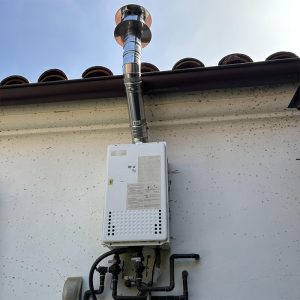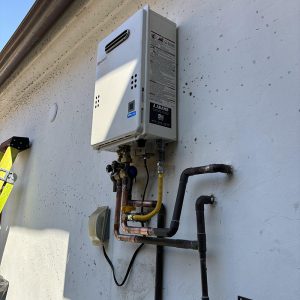Thinking about upgrading your home’s water heating system? You might be considering a tankless water heater, known for its energy efficiency and sleek design. These modern units heat water directly without the use of a storage tank, offering a continuous supply of hot water on demand.
This not only saves energy by cutting down on standby losses but also frees up space in your home due to their compact size. However, like any technology, tankless water heaters come with their own set of pros and cons. From their longer lifespan and reduced utility bills to the higher upfront costs and potential retrofitting challenges, there’s a lot to weigh.
In this article, we’ll dive deep into the advantages and drawbacks of tankless water heaters, helping you make an informed decision on whether they’re the right fit for your home.
A tankless water heater, often recognized for its efficiency and space-saving design, operates on the principle of heating water directly without the need for a storage tank. This innovative approach to water heating not only conserves energy by eliminating the standby energy losses associated with traditional tank heaters but also ensures a continuous supply of hot water on demand. By heating water only when it is needed, tankless water heaters can significantly reduce energy consumption, making them an appealing choice for environmentally conscious consumers and those looking to lower their utility bills.
Additionally, their compact size allows for greater installation flexibility, offering homeowners more options for placement compared to the traditional bulky tank systems. As a result, tankless water heaters represent a modern solution to the age-old demand for hot water, combining efficiency, convenience, and sustainability.

Addressing warm air issues in an air conditioner involves a systematic approach to troubleshooting that targets and rectifies the root causes. Below are detailed steps and a comprehensive table to guide you through effectively troubleshooting and potentially resolving issues causing an air conditioner to blow warm air, thereby restoring its cooling efficiency.
Tankless water heaters are renowned for their efficiency and ability to supply hot water on demand, positioning them as an optimal choice for contemporary living. Key advantages include:
These benefits underscore why tankless water heaters are a preferred choice for those prioritizing efficiency, convenience, and sustainability in their home utilities.
Tankless water heaters provide an uninterrupted flow of hot water, ensuring you never run out during use.
Experience the convenience of instantaneous hot water, perfect for immediate use without any delay.
These heaters are designed to operate only when needed, significantly reducing energy waste.
Benefit from reduced utility bills over the heater’s lifespan, thanks to its efficient operation.
Tankless water heaters cut energy usage by 24-34%, making them an eco-friendly and cost-effective choice.
Their compact design not only saves valuable space but also offers a sleek and unobtrusive addition to your home.
The small footprint of tankless water heaters allows for flexible installation options, maximizing your living space.
Enjoy up to 20 years of reliable hot water, making tankless heaters a durable and long-term solution.
Tankless water heaters are built to last, offering up to two decades of consistent performance.
Compared to the 10-15 year lifespan of traditional tanks, tankless water heaters provide a more sustainable and long-lasting option.

Despite the allure of efficiency and space-saving, tankless water heaters present certain challenges. Key drawbacks include:
These considerations highlight the importance of evaluating both the benefits and limitations carefully before deciding if a tankless water heater is the right choice for your home.
The initial investment for tankless water heaters is notably higher, with upfront costs that can be double those of traditional tank systems.
This significant financial commitment reflects the advanced efficiency and long-term savings offered by tankless technology.
Installing a tankless system may require substantial modifications to existing plumbing and electrical infrastructure, especially in older homes.
Retrofitting challenges are particularly pronounced in older homes, where the costs to update systems for tankless compatibility can escalate.
Tankless heaters can face difficulties in supplying hot water to multiple outlets simultaneously, which may not meet the needs of larger households.
To prevent issues such as scale build-up, tankless water heaters necessitate annual maintenance, ensuring their efficiency and longevity.
Ongoing maintenance is essential for maintaining the optimal performance and extended lifespan of tankless water heaters, underscoring a commitment to upkeep.
Tankless water heaters offer endless hot water supply, energy efficiency leading to lower utility bills, and a longer lifespan compared to traditional tank heaters. Additionally, these units require less space.
Tankless water heaters only heat water on demand, reducing the energy wasted in heating and maintaining a tank of hot water, leading to significant energy savings over time.
Tankless water heaters only heat water on demand, reducing the energy wasted in heating and maintaining a tank of hot water, leading to significant energy savings over time.
Installation costs for tankless water heaters are generally higher than those for traditional tank models, due to the need for retrofitting existing plumbing and, sometimes, upgrading electrical systems.
Yes, high-capacity tankless water heaters can supply enough hot water for a large family, but proper sizing is crucial to meet simultaneous demands without running out of hot water.
Regular maintenance, including descaling to remove mineral buildup and checking system components, is required for tankless water heaters to ensure optimal performance and extend their lifespan.
J. Adams Air Conditioning, Heating & Plumbing is a family owned and operated company. Our values are rooted in honesty, integrity and unparalleled customer service. Our kind and professional technicians provide service for all brands of HVAC equipment, plus diagnosis, repair and installation. We also offer top-quality plumbing services to make sure your home or business is running optimally.